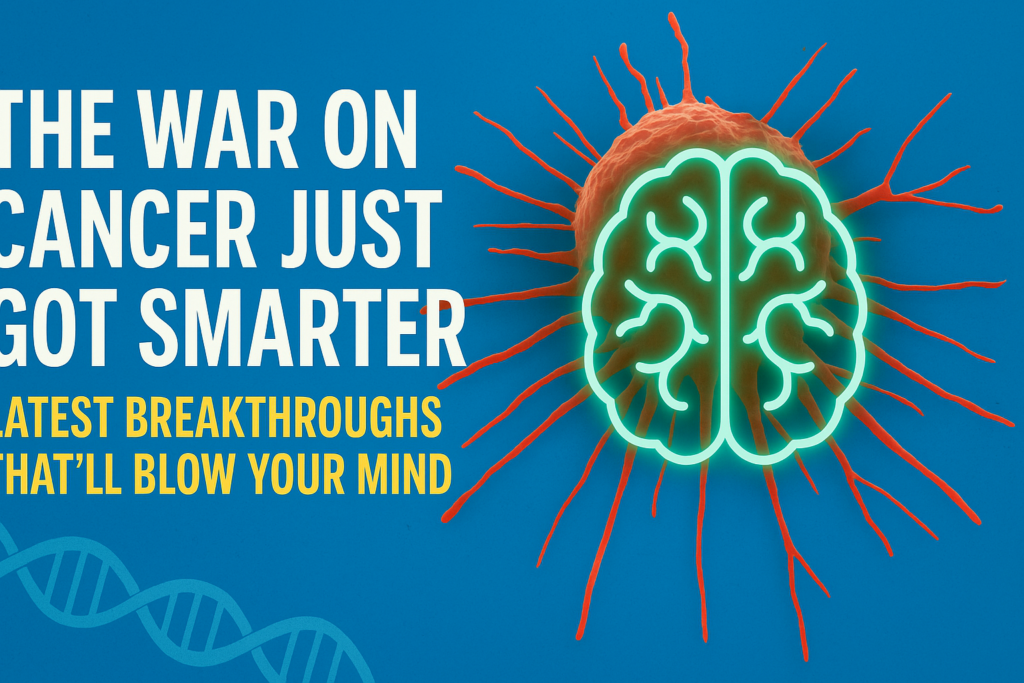Let’s be real—cancer research isn’t just about lab coats, microscopes, and long, unpronounceable drug names anymore. It’s a high-stakes, fast-paced game where science, tech, and sheer human grit are teaming up like the Avengers to knock cancer off its high horse. And guess what? They’re making some serious progress.
So, if you’re tired of the same old doom-and-gloom medical updates, buckle up. These oncology advancements aren’t just promising—they’re straight-up game-changers.
1. Immunotherapy: The Body Fights Back (and Wins)
First off, let’s talk about the all-star of new treatments—immunotherapy. Imagine giving your immune system a cheat code to recognize and destroy cancer cells. That’s what this does.
One standout in recent clinical trials is a therapy for non-small cell lung cancer. Researchers trained immune cells to spot a specific protein on cancer cells. The results? A dramatic drop in tumor size for many patients, with fewer side effects than traditional chemo. It’s like swapping a bulldozer for a smart drone. Cleaner. Targeted. Much cooler.
2. mRNA Technology: Not Just for COVID
Remember how fast we got those COVID vaccines? Thank mRNA tech. Now, researchers are flipping that same science toward cancer, crafting personalized vaccines that teach your body to attack specific tumors.
A recent trial using mRNA in melanoma patients showed fewer relapses and a stronger immune response. It’s still early, but the idea of a cancer “vaccine” isn’t science fiction anymore—it’s quietly becoming science fact.
3. CRISPR: Editing Cancer Out of the Picture
Gene editing has entered the chat. CRISPR, the tool that lets scientists cut and tweak DNA like a Word doc, is showing up big in cancer labs.
In one recent study, researchers used CRISPR to modify immune cells and make them more aggressive toward tumors. These souped-up cells were reinfused into patients battling advanced cancers—and in some cases, tumors shrunk dramatically. It’s the biotech equivalent of sending in a SWAT team with laser-guided weapons.
4. Liquid Biopsies: Diagnosing Cancer Before It Shows Up
Old-school biopsies? Painful. Invasive. Stressful. The new kid on the block is the liquid biopsy, and it’s changing the game.
Using a simple blood draw, doctors can now detect tiny traces of tumor DNA floating around in your system—sometimes before symptoms even show up. That means catching cancer early, when it’s still manageable and beatable. It’s like installing smoke detectors that go off before the fire even starts.
These are rolling out fast, especially for breast, colon, and prostate cancers, and they’re already being used in several ongoing clinical trials.
5. AI Joins the Fight
Artificial intelligence isn’t just for writing your emails or beating you at chess. It’s scanning thousands of medical records, genetic codes, and tumor images to spot patterns no human could ever catch.
AI is helping doctors predict how patients will respond to specific drugs, which saves time, money, and potentially lives. One project even uses AI to help pathologists identify rare cancer types with uncanny accuracy. It’s like having a genius co-pilot who never sleeps.
6. Combo Therapies: The More, the Mightier
In the past, cancer treatments were often a one-trick pony. Now, the trend is toward mixing it up—combining multiple new treatments for a stronger punch.
For example, pairing immunotherapy with radiation or chemo has shown better outcomes in cancers that were previously unresponsive to solo treatments. It’s like bringing multiple superheroes into the same battle instead of relying on just one.
These combo approaches are front and center in the latest clinical trials, and early results are pushing survival rates up across several cancer types.
What This All Means
Here’s the bottom line: cancer isn’t “solved” yet—but we’re getting smarter, faster, and a lot more precise in how we fight it. These oncology advancements are turning what used to be a blunt-force fight into a surgical strike. And the pace is only picking up.
So yeah, the science is cool. But the real win? Giving people more birthdays, more road trips, more “just one more” dance floors, and more time.
And that’s worth getting excited about.


